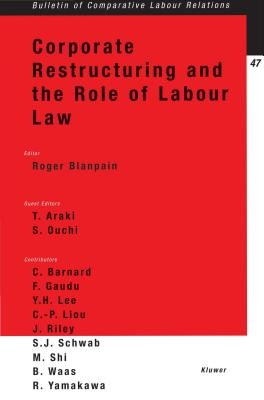
- We will send in 10–14 business days.
- Author: Roger Blanpain
- Publisher: Kluwer Law International
- Year: 2003
- Pages: 208
- ISBN-10: 9041119493
- ISBN-13: 9789041119490
- Format: 15.6 x 23.4 x 1.1 cm, minkšti viršeliai
- Language: English
- SAVE -10% with code: EXTRA
Corporate Restructuring and the Role of Labour Law (e-book) (used book) | bookbook.eu
Reviews
Description
This bulletin presents a comparative analysis of the degree of worker protection available today in nine countries in the event of corporate restructuring. The countries are France, Germany, the United Kingdom, the United States, Australia, China, Japan, Korea, and Taiwan. Each of the papers, presented by a noted industrial relations scholar from the country in question, proceeds from a summary of the national legal framework governing corporate restructuring, through the succession of employment contracts, to an analysis of such major components of the problem as justification of economic dismissals and changes in terms and conditions of employment. Specific topics covered in each analysis include the following: special legislation covering transfer of undertakings treatment of insolvent corporations economic dismissals before and after corporate restructuring transfer of workers in lieu of dismissal the role of labour unions and works councils The authors pay particular attention to the effectiveness of employee protection legislation such as the EC Transfer of Undertaking Directive (and its implementation by Member States) and Japan's Labour Contract Succession Law and, in the case of the United States, the virtual absence of such legislation. These papers were originally presented at the Sixth Tokyo Seminar (March 2002) of the Japan Institute of Labour. Their penetrating individual analysis and revealing comparative perspective is sure to help policymakers, lawyers, academics, and other specialists in industrial relations find a way forward in this important area that recognizes the best interests of both employers and employees.
EXTRA 10 % discount with code: EXTRA
The promotion ends in 22d.03:17:00
The discount code is valid when purchasing from 10 €. Discounts do not stack.
- Author: Roger Blanpain
- Publisher: Kluwer Law International
- Year: 2003
- Pages: 208
- ISBN-10: 9041119493
- ISBN-13: 9789041119490
- Format: 15.6 x 23.4 x 1.1 cm, minkšti viršeliai
- Language: English English
This bulletin presents a comparative analysis of the degree of worker protection available today in nine countries in the event of corporate restructuring. The countries are France, Germany, the United Kingdom, the United States, Australia, China, Japan, Korea, and Taiwan. Each of the papers, presented by a noted industrial relations scholar from the country in question, proceeds from a summary of the national legal framework governing corporate restructuring, through the succession of employment contracts, to an analysis of such major components of the problem as justification of economic dismissals and changes in terms and conditions of employment. Specific topics covered in each analysis include the following: special legislation covering transfer of undertakings treatment of insolvent corporations economic dismissals before and after corporate restructuring transfer of workers in lieu of dismissal the role of labour unions and works councils The authors pay particular attention to the effectiveness of employee protection legislation such as the EC Transfer of Undertaking Directive (and its implementation by Member States) and Japan's Labour Contract Succession Law and, in the case of the United States, the virtual absence of such legislation. These papers were originally presented at the Sixth Tokyo Seminar (March 2002) of the Japan Institute of Labour. Their penetrating individual analysis and revealing comparative perspective is sure to help policymakers, lawyers, academics, and other specialists in industrial relations find a way forward in this important area that recognizes the best interests of both employers and employees.


Reviews